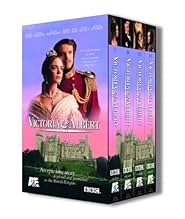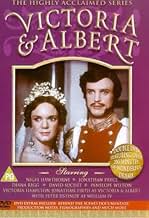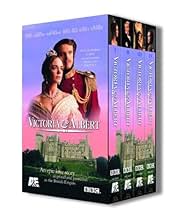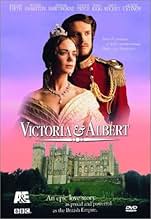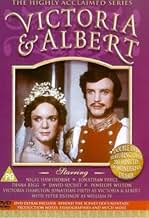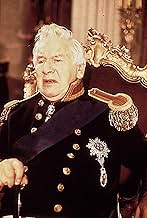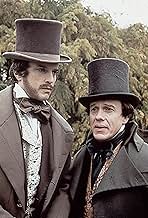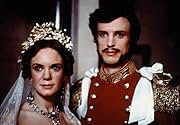Una apasionante historia de amor entre la joven reina Victoria y el príncipe Alberto, quienes desafiaron las intrigas de la corte británica para vivir un romance legendario.Una apasionante historia de amor entre la joven reina Victoria y el príncipe Alberto, quienes desafiaron las intrigas de la corte británica para vivir un romance legendario.Una apasionante historia de amor entre la joven reina Victoria y el príncipe Alberto, quienes desafiaron las intrigas de la corte británica para vivir un romance legendario.
- Ganó 1 premio Primetime Emmy
- 1 premio ganado y 3 nominaciones en total
Opiniones destacadas
Yes, the historical record is played around with a bit my sources have Baroness Lentzen (Victoria's governess) being given her matching orders in 1842, not 1840, and Albert didn't actually save Victoria from assassination at the hands of an Irish lunatic, though his progressive views on insanity as a defence to crime may have helped to save some of the insane from the hangman (US politicians take note). However, it was probably from Albert that Victoria got her Victorian morality, and he certainly was of great influence some say he was virtually King while he was alive, at least behind the scenes. As a German he had to keep a low profile in xenophobic Britain, but he gets the credit for the success of the Great Exhibition of 1851; even if Paxton (Richard Briers) actually designed the glass and cast iron `Crystal Palace' in which it was held, Albert had the sense to see that, flimsy as it seemed, Paxton's design was an ideal solution.
It is also sometimes forgotten that Victoria and Albert started out married life when barely out of their teenage years. Both were strongly influenced by older and more experienced people yet both managed to break free. While Albert may have been the better organised and disciplined of the two, Victoria had a remarkable determination to succeed at a particularly tough job. By the end of her long reign the British monarchy had been quietly transformed.
The voluminous correspondence of both parties (the Victorians seem to have written everything down) certainly suggest that Victoria was crazy about Albert, her first cousin, almost from the start, and that Albert, not so keen on Victoria to start with despite the dynastic advantages, grew to love her deeply. This is beautifully laid out in the film, and amongst all the splendour there is a remarkable intimacy. Someone (Melbourne?) suggests at one stage that Albert, through his influence over Victoria, had saved the British monarchy `for another 100 years.' Clearly, he is needed now. Somehow one cannot imagine an equally uplifting account of the present Queen and her consort being made, either now or in another 100 years.
This is a film that would have benefited immensely by double casting the leads/ breaking half way through to change them to older actors. (And one horrible mistake is opening and closing the film with an elderly wheelchair-bound Victoria played by another actress whose eyes are bright blue, and Hamilton's are brown.) Hamilton simply does not grow up enough, despite costumes and makeup.
Jonathan Firth (Albert) also suffers from the various age make-ups, fares much better, and brings more complexity to his role. He is always exceptional, and his role here is sympathetic, even when behaving badly, but he does look as if he had just finished crying during a lot of this film a bad allergy season, perhaps? He also does not make the transition to age believably.
Because of this, what makes this piece tick, run, and flow is the exquisite supporting cast. This is always the case with these BBC/A&E productions, and it may be what is really their core secret. People a town with geniuses, and any idiot can run the place . Well, that is what they do with their actors. Penelope Wilton has the standout performance as a desperate, emotional, miscalculating Queen Mum. David Suchet is simply perfect, and so far from Poirot you need to remind yourself that this is the same actor. Diana Rigg and Nigel Hawthorne also lend gravitas to production.
This production also features some really beautiful castle/historic locations, but this one is probably only for those who are addicted to the anglo-miniseries. (Almost exclusively indoor and talky, so boys will probably feel as pent up and useless as Albert did.)
This program did manage to shed some light on the real person and quite a bit I did not know.
I was not aware she was the niece of the previous king, thereby not directly in the bloodline, but simply next in line.
I think I had heard she was eighteen when she became queen, but I had forgotten.
And I wasn't aware of the problems with her mother and the uncle on her mother's side.
Sensational when she became her majesty, the Queen of England in their presence and they said no more.
Moments of what it means to be queen and what it means to be married were especially strong here;
when she had to respond to Albert as his wife and not as his queen.
And especially Albert's surprise when the Queen and not his wife honored him for that architectural structure.
I especially enjoyed dear Richard Briers, who never disappoints, as the architect.
When Albert informed him that the Queen had entered, Briers looks up and merely replies 'evening, mum' then continues to beam at his designs.
Her Majesty simply smiled and went to stand with her husband.
Performances were flawless all the way around. I do think Diana Rigg was wasted as the nanny. I've never enjoyed her as an unhappy person, but always in control.
I caught it on A & E, and didn't keep it. Now I wish I had. Ah well.
¿Sabías que…?
- TriviaNigel Hawthorne (Lord William Lamb, 2nd Viscount Melbourne) previously played Queen Victoria's grandfather King George III in The Madness of King George (1994).
- ErroresAt a state occasion prior to Victoria's marriage the orchestra is playing music from Strauss's operetta 'Die Fledermaus' which would not be written until many years later in 1874.
- Citas
Prince Albert: [Victoria bangs on Albert's study door] Who is it?
Victoria: [In a loud annoyed voice] What do you mean? "Who is it?" It's your queen!
Prince Albert: [Victoria takes a deep breath and calms down a bit knocks on the door calmly] Who is it?
Victoria: [In a calm and quiet voice] It's your wife.
[Albert opens the door and Victoria goes in and closes the door quietly]
- ConexionesVersion of Victoria the Great (1937)
- Bandas sonorasZadok the Priest
George Frideric Handel (as Georg Friedrich Händel)
Selecciones populares
- How many seasons does Victoria & Albert have?Con tecnología de Alexa
Detalles
- Fecha de lanzamiento
- Países de origen
- Idioma
- También se conoce como
- Victoria & Albert
- Locaciones de filmación
- Productoras
- Ver más créditos de la compañía en IMDbPro
- Tiempo de ejecución3 horas 20 minutos
- Color
- Mezcla de sonido
- Relación de aspecto
- 1.33 : 1



